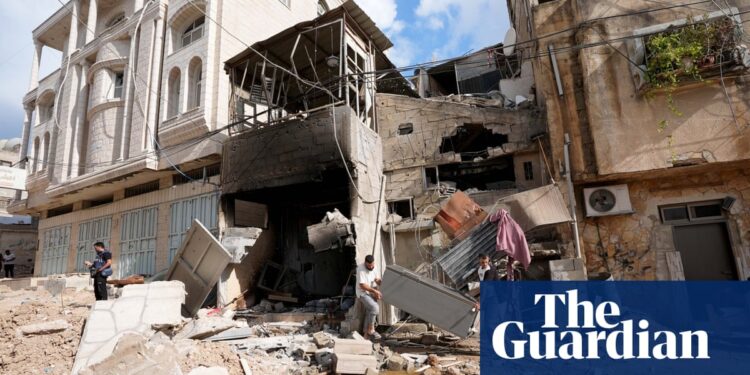The Israeli military said it had killed five Palestinian fighters inside a mosque in the West Bank city of Tulkarm, in the midst of one of the largest assaults on the occupied territory for months.
The overall toll of 16 Palestinians killed in less than two days would make it the deadliest Israeli operation in the West Bank since the 7 October Hamas attack in Israel which ignited the Gaza war.
The latest fighting came as the EU foreign policy chief, Josep Borrell, said on Thursday he had formally asked the bloc’s members to consider imposing sanctions on some Israeli ministers for “hate messages” against Palestinians that he said broke international law.
Borrell did not name any of the Israeli ministers to whom he was referring, nor specify which messages he had in mind. But in recent weeks he has publicly criticised Israel’s security minister, Itamar Ben-Gvir, and the finance minister, Bezalel Smotrich, for statements he described as “sinister” and “an incitement to war crimes”.
The second day of the Israeli operation, in which as many as three brigades of troops have been deployed in several major West Bank cities backed by helicopters, drones and armoured personnel carriers, also included raids in the northern city of Jenin and in the Jordan valley.
Inside Nur Shams refugee camp near Tulkarm, residents told the Guardian Israeli troops had gone house to house, detaining Palestinian men as they went.
Mohammed Aisha, a 42-year-old Nur Shams resident, speaking at a mosque just outside the camp, said: “The soldiers asked us to leave our house at 10am this morning and the Israelis made a big hole through the walls from one house to another. They handcuffed us with plastic strips and we were taken to a military base outside the city.”
Aisha described a scene of desolation left by the raid, adding: “All of our male neighbours were taken to the military base. The roads inside the camp were totally destroyed, sewerage pipes, water pipes were destroyed. The streets became hills of rubble, many houses are totally burned, this is not the camp we knew any more.”
On the outskirts of Nablus, 14 miles (23km) to the east, residents were told that some roads in and out of the city would be closed on Thursday, and the sound of drones – locally nicknamed “samiras” – could be heard overhead amid fears the operation would also target the city.
“People are saying that tonight it will be Nablus’s turn,” one resident called Ghassan said.
Fears are rising about the trajectory of the already serious violence in the West Bank, which has been fuelled by the actions of far-right settlers and their supporters in the government of Benjamin Netanyahu.
In recent weeks, Israeli defence officials have voiced their concerns that the situation in the West Bank could boil over, turning the territory into a major new front in Israel’s ongoing conflicts, even as the war in Gaza continues and tensions remain high with Hezbollah on the border with Lebanon.
Hamas repeated its calls for Palestinians in the West Bank to rise up, calling the raids part of a larger plan to expand the war in Gaza. The militant group has called on security forces loyal to the western-backed Palestinian Authority to “join the sacred battle of our people”.
The Palestinian Authority president, Mahmoud Abbas, has also condemned the Israeli raids, but his forces were not expected to get involved.
Referring to the latest West Bank assault, Israel’s foreign minister, Israel Katz, said in a post on X overnight: “This is a war in every sense, and we must win it.” He accused Iran of working to destabilise Jordan and establish an eastern front against Israel via arms smuggling networks, as it has done in Gaza and in Lebanon.
To address the threat of an eastern front, Katz said Israel would have to use “all necessary means, including, in cases of intense combat, allowing the population to temporarily evacuate from one neighbourhood to another to prevent civilian harm”.
Among those killed on Thursday was a local Islamic Jihad commander named as Mohammed Jaber. According to Palestinian reports, troops dressed in civilian clothes entered the mosque where an exchange of fire occurred.
Thursday’s fatalities come a day after Palestinian health authorities said at least 12 Palestinians were killed in Wednesday’s operations.
The continuing operation came as the UN secretary general, António Guterres, called on Israel to halt its military operation in the northern West Bank immediately. “Latest developments in the occupied West Bank, including Israel’s launch of large-scale military operations, are deeply concerning,” Guterres wrote on X.
Families of Israeli hostages being held in the Gaza Strip protested near the border on Thursday, demanding a deal to secure their release and at one point made a dash to try to cross into the coastal enclave.
Relatives of some of the 107 hostages still held by Palestinian militants in Gaza, carrying photographs and wearing shirts marked with red paint, gathered at Nirim kibbutz in southern Israel, about 2km (1.2 miles) from the border. They began by shouting messages of love and support through a stack of speakers pointed towards the Gaza frontier.






